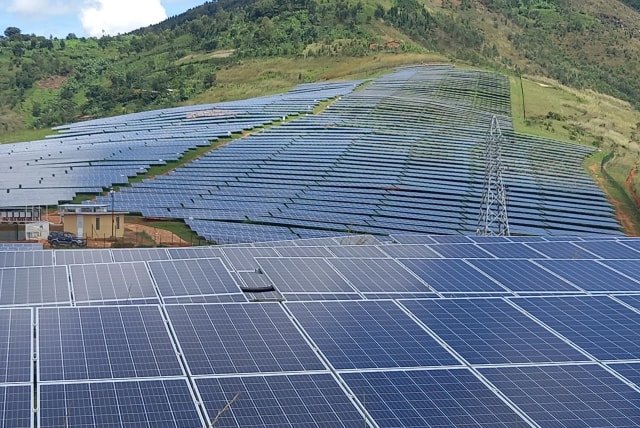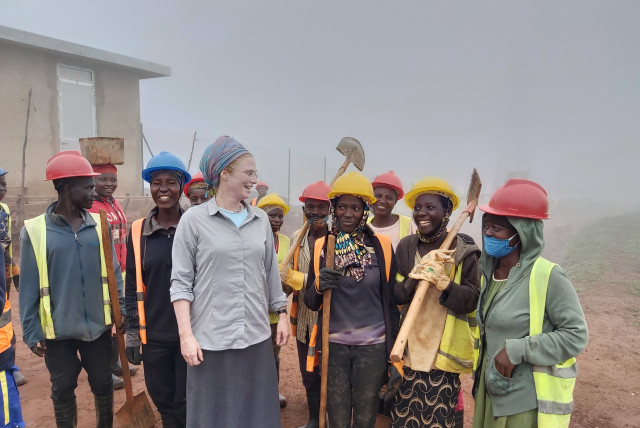Israeli solar pioneer, Burundi to double nation’s solar field’s capacity

President Évariste Ndashimiye will visit the Gigawatt Global plant, which started operating in May 2021 and now provides more than 10% of Burundi's electricity capacity.
The CEO of a multinational renewable energy company based in Jerusalem and the president of the small African country Burundi are expected to announce on Tuesday their intentions to double the generating capacity of the country's first and only utility-scale solar field.
President Évariste Ndashimiye will visit the Gigawatt Global plant, which started operating in May 2021 and now provides more than 10% of Burundi's electricity capacity.
Tuesday's event is the first official ceremony around the plant.
"This project demonstrates how the world community can realize shared development goals by utilizing international financing facilities best suited for frontier and emerging markets," said Gigawatt Global Burundi SA managing director Michael Fichtenberg.
The event is expected to be attended in person and remotely by dozens of foreign diplomats, ambassadors, project partners and local dignitaries. It will be broadcast on Zoom and live-streamed.
It took seven years and $15 million to develop and build the plant, said Gigawatt Global CEO Yosef Abramowitz – the most significant private investment in Burundi's energy sector in more than 30 years.
Abramowitz founded Gigawatt Global to develop profitable utility-scale installations, actively implementing solutions to promote the United Nations Sustainable Development Goals across Africa. It is a Dutch company, backed by American investors and headquartered in Israel. Abramowitz and many of the company’s senior leadership built Israel's first utility-scale solar fields as the Arava Power Company.
Since then, as a founding partner of the US Power African program, it has built the first utility-scale solar field in Rwanda - also the first in Sub-Saharan Africa outside of South Africa. In addition, it operates in South Sudan, Kenya, Nigeria, Zambia, Mozambique and Ethiopia, among other places.
"Our goals are ambitious," Abramowitz told The Jerusalem Post. "We take the impossible and make it possible."
Burundi's solar plant and Israeli technology
The Burundi installment is a 7.5-megawatt solar photovoltaic plant. It powers tens of thousands of homes and businesses with clean power.
"While other countries across the globe continue to build polluting power plants with dangerous emission levels, this project demonstrates how new technology and international financing partnerships can provide the electricity needed for economic development and industry in emerging markets sustainably and responsibly," Fichtenberg said.
He noted that the company is also moving ahead with securing land and funding to establish a small business and community center powered by solar energy. This "energy hub" will promote community development through women's empowerment and youth and employment programs.
"President Ndashimiye is demonstrating the sort of leadership which will encourage additional foreign direct investment from us and our investment and development finance partners," noted Abramowitz. "Burundi's business climate is improving, and we are confident we can continue to power their growth."
He said, "The international community should prioritize green energy projects that serve the most vulnerable communities. We hope many new international financing consortiums will partner with us to scale these impactful projects in the least developed countries."
WHEN GIGAWATT GLOBAL announced it would build the plant seven years ago, it was discouraged by the diplomatic community, Abramowitz recalled. He was warned that the country was at the top of the Genocide Watch list, with zero chance of success.
"We had to withstand a lot of uncertainty, coup attempts and all of the sorts of terrible dynamics - the same dynamics that landed Burundi at the bottom of the list of countries on the United Nations Human Development Index.
"Tuesday will be a very sweet day," Abramowitz said with a smile.
"Burundi's new president will cut the ribbon on the solar field… Everyone thought bringing green energy to the poorest places on earth was impossible. We have accomplished the goal and are raising the bar of the international community to say we can get to 100% clean energy by 2030."
To date, despite the African continent having the fastest growing population in the world, translating to increased energy and other needs, Africa receives less than 1% of global renewable funding, according to BloombergNEF.
Inspired Evolution, Renewable Energy Performance Platform and Gigawatt Global provided financing for the construction of the Burundi project.
Political Risk Insurance and refinancing of construction debt are being led by US International Development Finance Corporation (DFC), America's development bank.
Additional support for the project was provided directly and indirectly by the Energy and Environment Partnership and the Belgian Investment Company for Developing Countries. In addition, engineering, procurement and construction services were provided by the French firm Voltalia.
Building and operating the plant also gave jobs to some 300 citizens of Burundi, noted Patrick Nzitunga, who was born and raised in Burundi and recently moved to Israel with his wife. He served as a project manager for the plant.
"Burundi is only a little bigger than Israel, with a population of 11 million people," Nzitunga said. " The Country experienced a long social conflict and is trying to recover by attracting investment to fund his national development plan. The country has been experiencing magical progress, and I believe what I see here could be a perfect model for Burundi to adapt to a new reality and realize the progress we need."
Abramowitz said the company has a 25-year commitment to operate the site and that if it does not hit its energy goals, the company will be penalized.
He added that Gigawatt Global hopes to launch a similar project in South Sudan in 2024.
"The climate issue is a race against time," Abramowitz said. "Our message is that we are an impact platform that can scale now in a dozen countries. We have to deploy capital as quickly as possible."
Jerusalem Post Store
`; document.getElementById("linkPremium").innerHTML = cont; var divWithLink = document.getElementById("premium-link"); if (divWithLink !== null && divWithLink !== 'undefined') { divWithLink.style.border = "solid 1px #cb0f3e"; divWithLink.style.textAlign = "center"; divWithLink.style.marginBottom = "15px"; divWithLink.style.marginTop = "15px"; divWithLink.style.width = "100%"; divWithLink.style.backgroundColor = "#122952"; divWithLink.style.color = "#ffffff"; divWithLink.style.lineHeight = "1.5"; } } (function (v, i) { });


